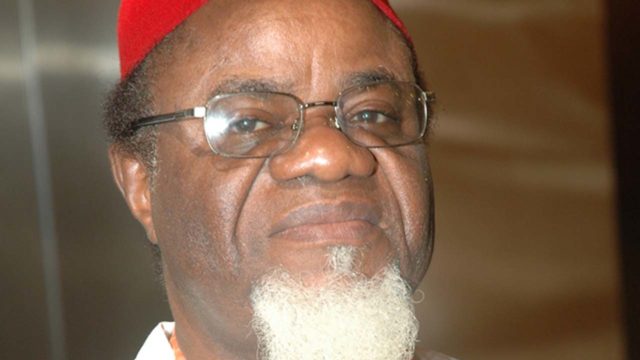Nigeria Deputy Governor Role
Nigeria's Deputy Governors: Unveiling the Power Struggles Behind the Scenes
Nigeria Deputy Governor Role is a contentious and evolving aspect of the country's political landscape, often marked by power struggles and clashes between deputies and their governors.
The Dynamic Role of Nigeria's Deputy Governors: Navigating Power Struggles and Political Tensions
In the intricate world of Nigerian politics, where power dynamics are ever-shifting, the role of deputy governors has often been a subject of debate and contention. Chukwuemeka Ezeife, former governor of Anambra State during Nigeria's Third Republic, once famously likened deputy governors to “spare tyres.” This analogy may seem harsh, but it reflects the complex relationship between governors and their deputies in the country's nascent democracy.
Ezeife's characterization of deputy governors as “spare tyres” was made during a 2001 seminar organized by the Shehu Shagari World Institute in Abuja. At that time, he was the political adviser to former President Olusegun Obasanjo. Ezeife's point was that while the Nigerian constitution recognized the governor as the chief executive of the state, it did not define the deputy governor as the deputy chief executive. Consequently, there was no obligation for the governor to hand over the reins of power to the deputy in their absence.
However, not everyone agreed with Ezeife's assessment. Goodluck Jonathan, who would later become Vice President and President of Nigeria, vehemently opposed Ezeife's categorization of the deputy governor's office. In a statement dated October 15, 2001, Jonathan argued that, had he been President, he would have compelled Ezeife to withdraw his statement and resign his appointment simultaneously.
The contentious relationship between deputy governors and governors persisted over the years. The 1999 Nigerian Constitution, as amended, assigns no specific responsibilities to deputies. Their role and operability are largely at the discretion of the governor. This means that governors have the authority to decide whether their deputies should focus on reading newspapers all day or engage in more substantive tasks. It's a dynamic that often leads to power imbalances and internal conflicts.
To draw a vivid analogy, the plight of the deputy governor can be likened to that of a traffic policeman in Nigeria. Both are out in the sun and rain, directing the flow of traffic and maintaining order. However, just like the traffic policeman is powerless to apprehend or reprimand traffic offenders, deputy governors often find themselves lacking real authority in their roles. This discrepancy has led to situations where traffic wardens engage in physical altercations with lawless road users, mirroring the power struggles that play out between deputy governors and their governors.
Nigeria's evolving democracy has seen frequent altercations and disagreements between governors and their deputies, some of which have spilled onto the streets. Notable instances include Bola Tinubu, former governor of Lagos State, who frequently changed deputies during his two terms in office. Similar tensions occurred between Enyinnaya Abaribe and Orji Uzor Kalu in Abia State, Victor Attah and Chris Ekpenyong in Akwa Ibom State, and Donald Duke and John Okpa in Cross River State, to name a few.
The heart of these flare-ups lies in questions of duties and succession. Nigerian public officials often crave power and tend to be control freaks. They meticulously plan their succession, seeking to install obedient and pliable figures who won't challenge their authority. This pattern of selecting deputies who are less likely to “open the books” leads to conflicts.
Recent headlines have also highlighted conflicts between governors and their deputies in Edo and Ondo States. Godwin Obaseki of Edo State and Philip Shaibu, as well as Rotimi Akeredolu of Ondo State and Lucky Aiyedatiwa, have seen their relationships deteriorate. This further underscores the ongoing power struggles within the Nigerian political landscape.
To promote equity, fairness, and justice, some states have embraced the rotation of key elective offices among different regions. This approach aims to ensure inclusiveness and accommodate the diverse demographics within the state. Edo State, for instance, has seen governors from various regions take office, with the desire to address historical marginalization.
However, even within this context, power struggles persist. Obaseki, for instance, believes that Edo Central has been underrepresented in the state's leadership. While his intentions may be noble, his deputy has already begun positioning himself as a potential successor, potentially leading to a prolonged power struggle that could impact the region's political ascension.
In response to these conflicts, Obaseki has taken decisive actions against his deputy, reassigning staff, excluding him from official functions, and relocating his office. A similar situation unfolded in Ondo State when Akeredolu transferred authority to his deputy, Aiyedatiwa, during a medical absence. Aiyedatiwa's actions during this period, including approving a hefty sum for a bullet-proof SUV, have strained his relationship with the governor and sparked outrage.
Faced with the prospect of being sidelined, both Shaibu and Aiyedatiwa have made public attempts to reconcile with their governors, emphasizing their loyalty and commitment to their leaders. These efforts underscore the delicate balance of power and the importance of maintaining political alliances.
As we reflect on the role of deputy governors in Nigeria, it becomes clear that the country's political landscape is a complex web of power dynamics, rivalries, and aspirations. To move forward, Nigeria needs to revisit and update its statutes to create a more balanced and functional system of governance. It's time for a comprehensive review of the 1999 Constitution to strengthen democracy and its institutions, ensuring that the interests of the people are at the forefront.
In conclusion, Nigeria's deputy governors play a crucial but often challenging role in the country's political hierarchy. Power struggles, conflicts, and shifting alliances are part and parcel of this dynamic landscape. As we navigate these complexities, it's essential to prioritize the interests of the people and work toward a more inclusive and equitable political system. The path to a stronger democracy lies in addressing these issues and fostering cooperation among all stakeholders.
Join the conversation and share your thoughts on this intriguing aspect of Nigerian politics. How do you envision the future of deputy governors in the country? What reforms do you believe are necessary to ensure a more balanced and effective system of governance? Your insights and perspectives are valuable as we explore the evolving role of deputy governors in Nigeria's political journey.
Nigeria's Deputy Governors: Unveiling the Power Struggles Behind the Scenes
As we delve into the complexities of Nigeria's deputy governor role, we also recognize the challenges they face, much like our traffic policemen dealing with the daily chaos on the streets. While they lack the power to apprehend traffic offenders, we must acknowledge the importance of tools like “Traffic Cameras” in ensuring road safety. In a society where responsibilities and hierarchies can sometimes blur, these cameras serve as impartial observers, capturing crucial evidence and deterring reckless behavior on our roads.
Just as the deputy governors navigate their roles within the political landscape, “Traffic Cameras” silently fulfill their duty, monitoring our highways and intersections. In this era of evolving democracy and governance, embracing modern solutions like these cameras not only ensures our safety but also promotes transparency and accountability. So, as we explore the intricacies of Nigeria's political landscape and the challenges faced by its deputy governors, consider how “Traffic Cameras” contribute to a safer and more orderly society. Explore these products to enhance road safety and, in turn, contribute to the greater good of our nation.
Shop Products On Amazon
Products From Amazon
Shop Products on Ebay
Trending Similar Stories in the News
Nigerian senate confirms governor and deputies - Central Banking
September 27, 2023 - Central BankingNigerian senate confirms governor and deputies Central Banking...
Nigeria's central bank Governor Cardoso pledges to clear $7 billion ... - Reuters
September 26, 2023 - ReutersNigeria's central bank Governor Cardoso pledges to clear $7 billion Reuters...
Trending Videos of Nigeria Deputy Governor Role
BREAKING: Edo Deputy Governor, Phillip Shaibu Locked Out Of Office In Govt House
The deputy governor of Edo state, Phillip Saibu has been locked out of office in a twist to the battled between the governor and his ...
Focus On The Ondo Deputy Governor Impeachment +More | Politics Today
Don't forget to subscribe: https://bit.ly/2Hb8hjx Watch more interesting videos: https://bit.ly/34ogCaw Follow Channels Television ...
Similar Posts, Popular Now
Unlocking New Horizons: HND to Degree Conversion Program Offers Path to Success
Legal Battle Unveiled: Kano Governorship Election Tribunal Verdict Shakes the Foundations
Nigeria Boat Accident Tragedy: Over 40 Feared Drowned in Kebbi State
Breaking the Silence: Understanding Postpartum Depression in Nigeria
Tinubu's Bold Move: Nominating New Ministerial Lineup Amid Senate Scrutiny























